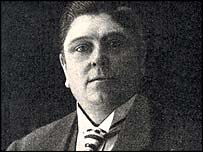I happened to make a reference to Alessandro Moreschi when writing a short story last week. It was one of those unplanned occasions where the image (or in this case the image of sound) is so precise that it requires no thought; it is a product of intuition.
I spent this week researching a forthcoming essay on Moreschi so I will not write too much in advance, but I wanted to share some of my favorite sources which are essential to gaining a human perspective on a man who is frequently derided and oggled if his name comes up at all these days.
Accessible on JSTOR:
Losing JSTOR was one of the greatest tragedies of my college graduation. I was thrilled to discover that a California library card provides (nearly) full access to the many databases included in JSTOR and is completely free. The following articles are indispensible to the understanding of the history of castrati from the baroque period to the end of bel canto.
1.
The Last Castrato by Alessandro Moreschi; Singers of the Sistine Chapel
Review by: Eric Van Tassel
Early Music , Vol. 13, No. 2, J. S. Bach Tercentenary Issue (May, 1985), pp. 326-328
Published by: Oxford University PressArticle Stable URL: http://www.jstor.org/stable/3127009
This short review of the remastered records made by Moreschi in 1902 and 1904 is typical of the preeminent modern opinion of his vocal work. Note that Van Tassel writes, "But we don't listen to Moreschi to be ravished by lovely singing or enlightened by profound musicianship. We go to him for clues, however faint and problematic, as to how Guadagni or Farinelli may have sounded." This marginalizing approach is taken by many modern music critics, especially in the 80's and 90's shortly after the tracks were released. It is common for the author to express a desire to use Moreschi as a vehicle to the greater, more accomplished castrati and, ultimately, a frustration in their inability to do so.
2.
The Castrato as History
Cambridge Opera Journal , Vol. 8, No. 2 (Jul., 1996), pp. 167-184
Published by: Cambridge University Press
Article Stable URL: http://www.jstor.org/stable/823666
While Bergeron still commits the sin of using Moreschi as a pass-through rather than an individual meriting specific historical analysis and attention, her frank descriptions of her own reaction to his recordings are something most people can relate to. The extra-human quality to Moreschi's voice no doubt explains why so many literary authors have been compelled to write in his memory (Kingsley Amis, Luc Leruth, Kenneth Rosen).
It is important to note that this essay is framed around a review of the film Farinelli (1994) and also contains an excellent mini-history of castrati in Europe.
3.
The Castrati as a Professional Group and a Social Phenomenon, 1550-1850
Acta Musicologica , Vol. 60, Fasc. 2 (May - Aug., 1988), pp. 143-179
Published by: International Musicological Society
Article Stable URL: http://www.jstor.org/stable/932789
Free articles and websites:
1.
https://letterpress.uchicago.edu/index.php/voicexchange/article/download/93/120
This is the most important essay on Moreschi that I have yet read. Martha Feldman, working with Martina Piperno, gives us a full and detailed history of the Moreschi and Fellini (yes! There is a connection!) families taken directly from interviews with their descendants. There are some lovely photographs (although none new of Moreschi himself) and some rather surprising biographical information that, at least for me, fully recontextualized his work.
2.
www.velluti.org
This website is an excellent jumping-off point for general information about castrati and contains good pointers and links to other sources (it is the only place I found to mention Leruth's "La 4e Note").
Books:
1.
Moreschi and the Voice of the Castrato by Nicholas Clapton
I look forward to receiving this book, so perhaps it is cheating to include it on this list; however, I am assured that it is an excellent and generous account of Moreschi's life and "fills in the gaps" where other historians have glossed over. I am interested to see how it complements Matha Feldman's work,, which came later and included interviews with family members to whom I believe Clapton did not have access.
2.
Matha Feldman's forthcoming books on castrati and Moreschi
Here I cheat again, but judging on her article, above, these books ought to be a fulfilling and informative read for anyone as fascinated by the subject matter as I.




